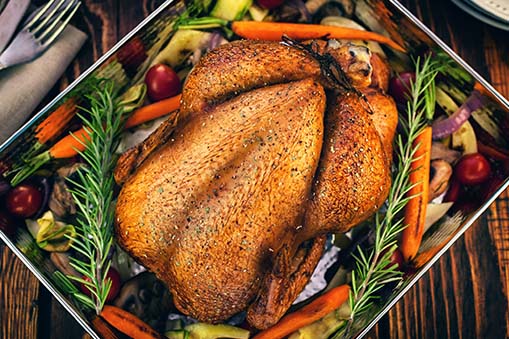Unlocking the health benefits of turkey

Turkey has long been a favorite holiday dinner feature in the United States. Historians report that turkeys have been part of harvest feasts in the U.S. since the early 1800s. In recent years, turkey has gained a reputation for being a healthy choice for big holiday meals. But is it as healthy as people think?
According to Catherine M. Champagne, a professor of nutritional epidemiology and dietary assessment and nutrition counseling at Louisiana State University's Pennington Biomedical Research Center in Baton Rouge, it is. But there are some key caveats.
Know the turkey perks
"Turkey [meat] is a great source of protein, rich in many vitamins and minerals, and is low-fat," Champagne said. That balance of being high in protein and low in fat means turkey meat can help your muscles grow and repair without making you gain weight in an unhealthy way.
According to Champagne, turkey is also rich in thins such as:
- B-complex vitamins niacin, B6 and B12, which help your body turn food into energy and keep your skin healthy.
- Choline, an essential nutrient that boosts your brain and nervous system health.
- Important minerals like magnesium, phosphorus, and selenium, which keep your bones and muscles strong and support your immune system.
- Iron, which is part of hemoglobin that helps carry oxygen from our lungs throughout our entire body.
- Potassium to support a healthy heart, blood pressure and fluid balance.
- Zinc to support your immune system.
Turkey skin is a different story. While dark meat has a bit more fat and calories than white meat, according to Champagne, the more important factor is whether you eat the turkey with or without the skin.
If you have a 3-ounce portion of roasted turkey breast with skin, it comes with roughly 4.5 grams of fat and 139 calories. However, if you enjoy the same serving without the skin, it contains only about 1.8 grams of fat and 125 calories. Similarly, if you have 3 ounces of dark meat with skin, it contains around 8.5 grams of fat and 175 calories. But if you remove the skin, the fat content drops to 5.1 grams, and it's 147 calories.
Keep it healthy
Turkey has become more popular in recent times, and now many families enjoy it more than just once a year. Turkey and other types of poultry are part of a healthy dietary pattern, according to federal dietary guidelines.
Keep in mind, how you prepare your turkey makes all the difference in keeping it healthy, according to Champagne. Here are some key tips to remember:
- Go light on the seasonings and marinades. They can add sodium. The American Heart Association recommends no more than 2,300 milligrams a day and an ideal limit of no more than 1,500 mg per day for most adults.
- Don’t eat a fried bird with the skin still on. Regular consumption of fried food has been linked to cardiovascular problems. Champagne said most of the oil in a fried turkey is absorbed by the skin. So, you can avoid the extra fat and calories by not eating the skin.
- If you are going to fry it, fry it right. "The critical point is to properly fry the turkey," said Champagne, by maintaining the correct cooking temperature during the frying process. "Use healthy fats, like peanut or canola oil, and don't allow the turkey to soak in the oil after cooking."
- Remember, not all turkey products are created equal. Fans of turkey sausage, turkey bacon and other processed varieties need to check the labels. "I always choose the lower-fat ones, which don't have skin added, and I always check the sodium content as well," said Champagne. The AHA's newest guidance on a heart-healthy diet emphasizes choosing lean cuts of meat and poultry over processed forms.
Turkey is an infamous source of tryptophan, an essential amino acid that helps the body synthesize protein. Many people blame tryptophan for their post-feast sleepiness, but Champagne said roasted, skinless turkey has similar levels of tryptophan as roast beef or canned tuna, and less per ounce than cheddar cheese. "It is more likely that the typically large amounts of carbohydrates in the holiday meal provide the most contribution to sleepiness."
Healthy holiday eating is about more than turkey, of course. But Champagne's verdict is that turkey fits nicely into a such a plan.
She advises, "Use portion control, and consider eating the meat without the skin, especially if you indulge in a portion larger than the recommended 3-ounce serving."





